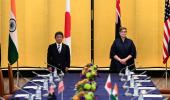The US has been, historically, a sleeping partner in India-China relations.
Today, any attempt by the Modi government to make a bilateral move to improve relations with Beijing could upset Biden's apple cart, notes Ambassador M K Bhadrakumar.

The Axios reported(external link) last Friday that President Joe Biden plans to meet his counterparts from the so-called Quad -- Japan, Australia and India -- on March 12.
Biden's plan can potentially transform the regional alignments in the Asia-Pacific. Its impact on the India-China relationship will be profound.
Biden is in a hurry and would have a Quad summit even before he meets with the US' closest allies in Europe. Presumably, this dramatic initiative has come as an afterthought.
The Quad did not even merit a reference in the 'first major foreign policy speech'(external link) delivered by Secretary of State Antony Blinken on March 3 or in the document titled Interim National Security Strategic Guidance(external link) released by the White House the same day.
The latter document referred to India the following way: 'We will deepen our partnership with India and work alongside New Zealand, as well as Singapore, Vietnam, and other Association of Southeast Asian Nations member States, to advance shared objectives.'
The first news of the White House initiative came through a media leak by 'people familiar with the matter.'
Its optics matters, as anything that smacks of a tough approach to China appeals to the US domestic opinion.
A new Pew Research Center survey(external link) released said nine-in-ten US adults (89%) consider China a competitor or enemy, rather than a partner, but only 53% say they have confidence in Biden when it comes to dealing effectively with China.
The Biden presidency is struggling to show 'America is back' on the world stage. The mess-up(external link) in the US-Saudi alliance, the wanton bombing(external link) of Syria and the overall drift on the Iran issue(external link) have generated sharp criticism.
Fundamentally, the Biden administration faces a predicament. Blinken in his speech last Wednesday called the US's relationship with China as the 'biggest geopolitical test of the 21st century.'
'China is only country with the economic, diplomatic, military, and technological power to seriously challenge the stable and open international system -- all the rules, values, and relationships that make the world work the way we want it to, because it ultimately serves the interests and reflects the values of the American people,' Blinken said.
Yet, neither Blinken nor the interim guidance report outlined any specific policies as such toward China. Biden inherits Trump's thinking on China, but he is also willing to collaborate with China if that is in American interests.
Biden appears to be leaning toward the EU's thinking, which regards China as a 'systemic rival'(external link). It is breakthrough for realism.
On the one hand, the US faces internal disarray (due to the pandemic, economic recession, socio-political polarisation, etc.) while on the other hand, the US’ allies have serious divergences over China that are hard to reconcile.
Whereas the US is saddled with an outdated economy, China has a full-bodied reform program(external link) going under the 14th Five-Year Plan (2021-2025).
In reality, Blinken's choice of 'competitive' rhetoric hides a pragmatic view of the US; declining power.
Blinken said right at the outset in his speech that 'those of us who conduct foreign policy haven't always done a good job connecting it to the needs and aspirations of the American people.'
As he put it, 'We will fight for every American job and for the rights, protections, and interests of all American workers... And our trade policies will need to answer very clearly how they will grow the American middle class, create new and better jobs, and benefit all Americans, not only those for whom the economy is already working.'
The structure of US diplomacy stemming from the 'foreign policy for the middle class' -- to borrow Biden's words -- is unlikely to prioritise investment in the security field or choose confrontation with China.
There is going to be, for sure, severe contestation with China, but it will be over tariffs, sanctions and entities left by the Trump administration or in the efforts to create new supply chains to wean the US economy off dependence on China.
The US may maintain its presence and military deployment in the Indo-Pacific but it will be for calibrating the pressure on China from a position of strength rather than confront China militarily.

Suffice to say, India has to ponder seriously the pros and cons of putting all its eggs in the Quad basket.
During the call with External Affairs Minister Jaishankar(external link) on February 26, Chinese State Councillor and Foreign Minister Wang Yi blamed India's vacillation and 'negative retrogression' in its policy on China in the most recent years for the disruption in bilateral pragmatic cooperation.
Wang stressed that the two sides should maintain the strategic consensus reached by their leaders -- quintessentially, neither side should regard the other in adversarial terms.This is the crux of the matter.
The international perception happens to be that Quad is an embryonic 'Asian NATO' (external link) and is an anti-China strategic construct, no matter the mantra that it is not directed against country.
India's close association with the Quad may please the Biden administration at a time when it has such gnawing doubts about the US' grand ambitions and big talks about cornering China in an open-ended systemic game in league with its allies.
The Quad would collapse without India's participation. The ASEAN will not touch it with a barge pole.But the benefit that accrues to India out of the Quad remains the 'unknown unknown'. Furthermore, there will be negative consequences.
The recent positive signals in the India-China relations not only achieved a smooth completion of disengagement of frontline troops in the Pangong Tso lake area but is taking shape as a gradual de-escalation in the overall relationship, especially in the economic sphere.
However, the trust deficit is such that, as a senior Chinese pundit Lan Jianxue, a deputy director at the China Institute of International Studies, a professional research institute directly administered by the ministry of foreign affairs in Beijing, noted,(external link) 'the signal of detente from New Delhi is rather weak, and we (Beijing) need to make an accurate judgment... India's attitude, along with its China policy, keeps changing. This makes it difficult to understand what India plans to do with China-India relations.'

'Since the 2017 Doklam standoff, China-India strategic mutual trust has been severely damaged. It is hard to re-establish high-quality mutual trust... From this perspective, there are two pragmatic choices,' Lan Jianxue noted.
'First, differences should be well managed in order to avoid escalating the situation to a risky state like last year. Second, cooperation should be maintained in any area possible while interrupting or hurting each other should be avoided,' Lan Jianxue added.
At such a sensitive juncture, any perceptions of Prime Minister Modi ganging up with Biden to contain and interfere with China's development could have negative repercussions.
Equally, it is entirely conceivable that the US intentions behind such unseemly hurry to upgrade the Quad betrays growing unease over the nascent signs of improvement in India-China bilateral relations.
The US has been, historically, a sleeping partner in India-China relations.
Today, any attempt by the Modi government to make a bilateral move to improve relations with Beijing could upset Biden's apple cart.
Alarm bells must be ringing in Washington that Xiaomi recently announced its investment plans(external link) to expand its manufacturing capabilities in India.
Xiaomi partners with DBG, a Chinese company focused on automobiles, electronics, rail transit, which has supplied telecom equipment to players such as Huawei.
Now, this is the sort of Chinese partnership in the Indian market that unnerves the US most, as it makes a mockery of Biden's entire Indo-Pacific concept built on antipathy toward China.
Meanwhile, Reuters reported(external link) last month citing Indian officials that 'India is poised to clear some new investment proposals from China in the coming weeks as frosty relations between the two neighbouring countries thawed amid an easing in border tensions.'
The report said the pending proposals include China's Great Wall Motors' acquisition of a General Motors plant in India.
Great Wall Motors is gung-ho on its India prospects, where it will invest in a big way for manufacturing of cars and lithium-ion batteries.
The company plans to manufacture EVs(external link) too at this plant. It also plans to invest in battery manufacturing in India, along with further investments in dresearch and development.
The Reuters report said, 'The government is also considering allowing some investment from Chinese firms in certain sectors via the 'automatic' route, or without government scrutiny.'
All this is happening at a time when Tesla Inc also is exploring an agreement to make electric vehicles in India for the first time.
To be sure, the Biden plan to upgrade the Quad has appeared against a backdrop where prospects of big-time Chinese investments in the Indian economy look brighter than ever before. It cannot be a coincidence.
Ambassador M K Bhadrakumar served the Indian Foreign Service for more than 29 years.
Feature Presentation: Rajesh Alva/Rediff.com











 © 2025
© 2025